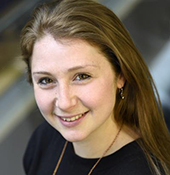Georgia Lockwood-Estrin is a Sir Henry Wellcome postdoctoral research fellow at the Centre for Brain and Cognitive Development at Birkbeck College, University of London in the United Kingdom.

Georgia Lockwood-Estrin
Postdoctoral researcher
Birkbeck College, University of London
From this contributor
Autism in girls: Jumping hurdles on the path to diagnosis
The barriers to an autism diagnosis are especially challenging for women and girls. A big part of the problem is still the perception of autism as a ‘male’ condition.

Autism in girls: Jumping hurdles on the path to diagnosis
Explore more from The Transmitter
Neuro’s ark: Spying on the secret sensory world of ticks
Carola Städele, a self-proclaimed “tick magnet,” studies the arachnids’ sensory neurobiology—in other words, how these tiny parasites zero in on their next meal.

Neuro’s ark: Spying on the secret sensory world of ticks
Carola Städele, a self-proclaimed “tick magnet,” studies the arachnids’ sensory neurobiology—in other words, how these tiny parasites zero in on their next meal.
Autism in old age, and more
Here is a roundup of autism-related news and research spotted around the web for the week of 2 March.

Autism in old age, and more
Here is a roundup of autism-related news and research spotted around the web for the week of 2 March.
Lack of reviewers threatens robustness of neuroscience literature
Simple math suggests that small groups of scientists can significantly bias peer review.

Lack of reviewers threatens robustness of neuroscience literature
Simple math suggests that small groups of scientists can significantly bias peer review.